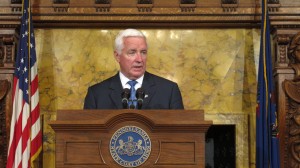Governor’s office denies involvement with health department drilling policies
-
Marie Cusick -
Katie Colaneri

Marie Cusick/ StateImpact Pennsylvania
A spokesman for Gov. Corbett said the governor’s office was not involved in the Department of Health’s policies on handling drilling-related health complaints.
At a press conference Wednesday afternoon, Governor Tom Corbett refused to answer questions about allegations state health department employees were silenced on the issue of natural gas development.
A StateImpact Pennsylvania investigation has revealed that in 2012, employees were sent a list of drilling-related “buzzwords” as part of a guidance for how to handle drilling-related health complaints. The words and phrases included drilling, fracking, Marcellus Shale, skin rash, and cancer cluster. The list was accompanied by instructions to send complaints to the Bureau of Epidemiology.
Two department staffers — now retired, but active when the guidance was sent out — said employees were also instructed orally not to discuss symptoms and other information with callers who mentioned words or phrases on the list. The retired workers claim they were also told not to personally to return phone calls from people who used the words.
Documents obtained by StateImpact Pennsylvania also show that starting in 2011, community health employees were required to get high-level permission to attend meetings and forums on Marcellus Shale topics.
The Health Department initially denied the existence of both the drilling “buzzwords” list and the employee permission form. A spokeswoman called the two retired employees’ claims “erroneous.”
The department later acknowledged the existence of the documents, but said these policies were meant to guide–not silence– employees in responding to complaints.
After the press conference, Corbett spokesman Jay Pagni initially refused to comment on the matter, but later said the Governor’s office was not involved in creating the policies.
“The Department of Health shared, as information to us, that they sent these documents as a means to inform staff of an emerging public health issue,” he said. “If you get a question that involves something that has to do with natural gas drilling, know that it’s a public health issue, and report that up the chain through your supervisor. That’s it.”
















